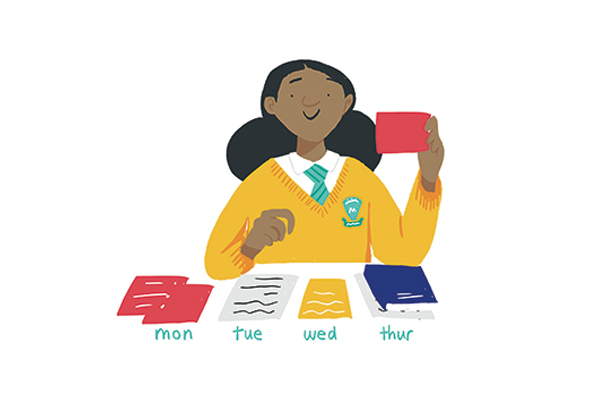Did you know that how you learn is just as important as what you learn? According to expert educator and author, Dr Barbara Oakley, it’s possible to develop some simple learning habits that will help you become a better learner. And work faster and smarter.
From the brain’s different learning modes to memory techniques and dealing with procrastination – the methods that she’s shared across her books and courses have helped millions of people. Her Coursera course, ‘Learning how to learn’ is one of the most popular online courses in the world. Many of the 2.5 million people who have taken it say that it improved their learning for good (including our CEO Bertie Hubbard, who might be her number-one fan).
So, to help you boost their study habits and help them become a better learner, Dr Barbara shares her 6 top takeaways. Plus, you can watch her helpful webinar below.


1. It’s good to be a slow learner
Yes, you read that right. Although there are some learners out there who seem to absorb new information like a sponge, that’s not the only way to succeed. “Some people are really fast learners and they can run to the finish line really fast,” says Dr Barbara.
“Other people are more like hikers – they can get to the finish line, but it’s a lot slower. As they’re walking, they can really think about their experience. In some ways this is far richer and deeper.”
So, although it might feel frustrating when you don’t get new concepts right away, the process of carefully listening and taking the time to really get your head around a subject can mean that new knowledge really sticks.
2. Poor memory can be a sign of creativity
Just like with quick learners, there are some clever clogs who can easily remember lots of facts. But, taking the time to fix new info in your brain can mean it’s more likely to stay in there for good. If you have a bad memory, you just need to spend a little more time or develop techniques like songs or rhymes to make sure the information passes into your long-term memory.
“When information falls out of your brain, if you get distracted while learning, something else comes in,” says Dr Barbara. “These individuals are often very creative.” So, the flipside of a poor memory can be creative thinking – an awesome skill that can work for you in plenty of other ways.
3. Being a genius is overrated
What Barbara means by this is that always being right can lead to a poorer learning attitude. Know-it-alls can become less inquisitive and sometimes, less able to consider different perspectives and points of view.
“The problem with geniuses is they’re so used to learning quickly, always being right, that they jump to conclusions and don’t look carefully at what’s going on in the real situation,” says Dr Barabara.
In terms of success at school, this wisdom from Barbara can help us see that a huge part of academic success comes from a healthy attitude towards learning. Rather than an innate ability that you either have or you don’t.
4. There’s no such thing as (not being) a ‘Maths person
Lots of people think they can’t do Maths, and leave it at that. But this attitude can sometimes be a barrier to the subject – and all the other career pathways that come with it. “When my daughters said Maths just wasn’t for them, I suggesting adding 20 minutes of extra Maths a day – for 10 years! And it paid off – one is fulfilling her dream of becoming a doctor and the other is completing a PhD in Data science,” says Dr Barbara.
For students up to GCSE level, Barbara recommends the learning platform Kumon for online Maths courses. MyTutor online tutors also have the recent exam experience to help your teen get the best grades you can.
5. Asking for help early and often is key
“Every day when you start running into a challenge, try to get someone to lend you a hand. You’ll see that as you become better at it, you won’t need so much hand-holding,” says Dr Barbara.
Whether it’s a teacher, tutor, older sibling or parent, encourage your teen to shake off any embarrassment and get into the habit of asking for help. This will make them a better learner – especially if they have deadlines like coursework submissions or exams. The further in advance of these dates that they get help, the higher their chance of reaching their full potential.
6. Get comfortable with feeling uncomfortable
There are always challenges in learning. Try to encourage your teen not to be afraid of what they have ahead of them. Teens – and all learners – shouldn’t label themselves as either totally amazing or (most importantly) not smart enough to achieve their goals. Determination, an openness to being wrong and learning to tolerate discomfort – all with a positive attitude to challenges – will set them up to become a better learner. And help them do their best at school and beyond.
Look for more inspiration? You can watch the full webinar, ‘How to Learn: MyTutor with Barbara Oakley’ below.
Further reading and learning from Dr Barbara Oakley
“Uncommon Sense Teaching: Practical Insights in Brain Science to Help Students Learn“, Barbara’s 2021 book to pre-order
“Learn Like a Pro: Science-based Tools to Become a Better Learner”, Barbara’s other 2021 book to pre-order
“Learning How to Learn: How to Succeed in School Without Spending all your Time Studying; A Guide for Kids and Teens“, Barbara’s book from 2018
Learning how to Learn for Youth – Free Coursera online course for teens
Learning how to Learn:Powerful Mental Tools to Help you Master Tough Subjects – Free Coursera online course for adults (and keen teens)
Barbara’s popular Ted Talk, Learning how to Learn




